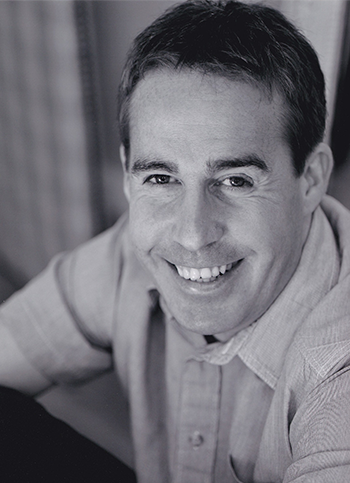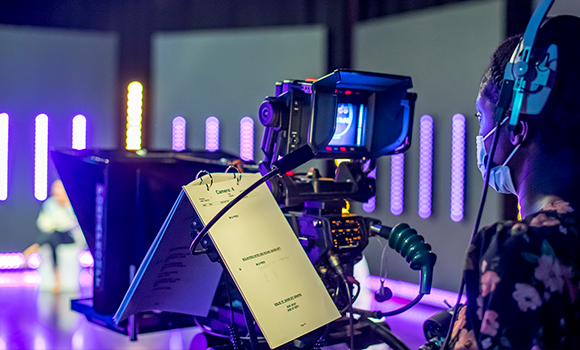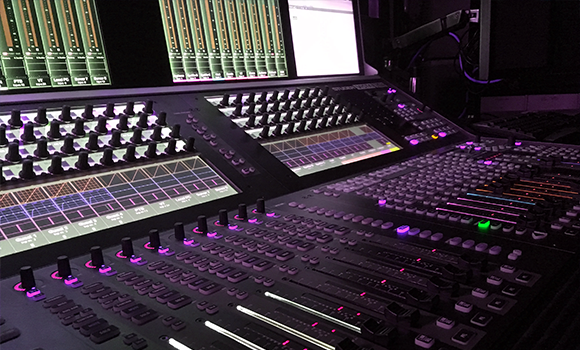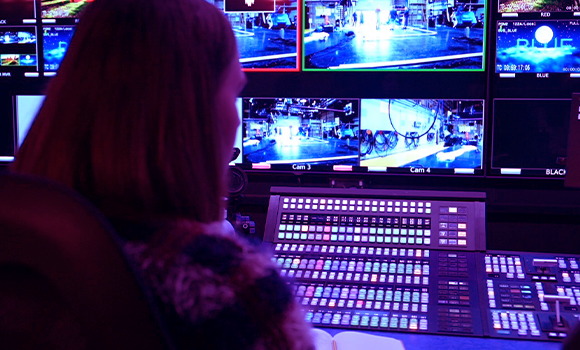Meet Andy Hope: Course Leader for the NFTS Diplomas in Cameras, Sound & Vision Mixing
Amongst the host of industry professionals and creative minds heading up courses at the National Film and Television School is Andy Hope, Course Leader for our Diplomas in Cameras, Sound and Vision Mixing for Television Production.
In this piece, we introduce you to Andy and his role in leading these 12-month post-graduate Diplomas, which aim to prepare students for successful futures in the exciting world of multi-camera studio entertainment production.

Having worked in the music and television industries for 30 years, Andy’s career has spanned roles as a Music Recording Engineer, to Producer, TV Sound Supervisor and TV Director. Alongside his work at the NFTS he is still actively involved in music recording and composition in the industry.
As the Course Leader for the Cameras, Sound and Vision Mixing Diplomas at the NFTS, how have you evolved the course?
“The courses are now well established at the School and within the industry, having been running for nine years, with students going on to work at Sky Studios, BBC Studioworks, ITV, CTVOB, Discovery and many others. I am very conscious of the appetite that broadcasters have for employing staff who are skilled in more than one discipline, I intend to introduce a directing element to the Vision Mixing course, with the combined role of vision mixing and directing (or Technical Directing) becoming more common, especially in News and Sport productions.

The focus of the diplomas will still very much be on the entertainment sector of the industry, including music; quiz; chat shows and sitcoms.”
What aspects of your career have you enjoyed working on the most and why?
“One of the most enjoyable aspects of my career has been having the opportunity to be creative and innovative and to develop new programme ideas and ways of working. Being a day to day Sound Engineer or Television Director is enjoyable and rewarding within itself but, being able to create and launch new programme formats and styles and to enhance existing formats and ways of working has always been something that I have been drawn towards.”
Following the pandemic, we’ve seen television production booming once again with a shortage of skilled people to fill the roles.
How do the courses prepare students to meet the current demand?
“From my experience of working in the television industry, the main features a broadcaster is looking for when taking on a new recruit, is that they have good experience and knowledge in their chosen discipline; they are professional in their attitude and that they turn up on time! These are key skills and assets that anyone must have in order to work in live TV and they are fundamental to the way we prepare the students for life in the industry.
“What makes these courses so special is the sheer amount of time spent in practical training and working on live shows in the studio.”
The course is very practical, with students being trained in our state of the art TV studio facilities on site in Beaconsfield and working on live productions from an early stage, from music to quiz shows. Students have a strong work ethic and professionalism right from day one - I tell them to treat the course here at the NFTS as their first job in television. I am so impressed by how professional the current students are, coming towards the end of their course, and how well prepared they are to step straight into a professional TV environment.”
What are you looking for in a typical Cameras, Sound and Vision Mixing student?
“The word passion is much overused in the media industry, but it is the key thing I am looking for in a Cameras, Sound, or Vision Mixing student. You have got to really want to work in this industry and have a love for TV programmes and the way they are made. Also, students need to be aware of how demanding the industry is. It is important to understand that great shows like Strictly Come Dancing or beautifully produced dramas like The Crown have a vast team of people all working extremely hard in the background and often on a freelance basis. If you love Sound; want to be a TV Camera Operator or cut a top music show and are prepared for all of the above, then go for it!”

Why should prospective students apply for the Cameras, Sound and Vision Mixing courses at the NFTS and what makes them different to studying similar diplomas elsewhere?
“The key aspect to these diplomas that makes them so unique in the education/training sector, is that they are very practical “hands-on” courses that are focused on training students to be working professionals after one year. There is important theory training as well, but the emphasis is on becoming skilled craft professionals.
By the end of the 12 months at the school, students are prepping and working on broadcast quality live music; quiz and sitcom shows, either here at the school or at Sky Studios, who we work with during parts of the course. There are obviously a whole wealth of different courses available now in the UK, from short courses to three-year undergraduate degrees, but what makes these courses so special is the sheer amount of time spent in practical training and working on live shows in the studio.

There is also a large amount of collaboration with students on the other courses, including the Directing and Producing TV Entertainment MA, which provides students with useful networking opportunities. Students are on a busy schedule throughout the year at the School and benefit from a six-week summer work placement at Sky Studios. This kind of work experience is invaluable to students in terms of experiencing professional live TV and networking within the industry.”
Find out more about these Diplomas!
Visit the course pages to find out more and start your application today.
Cameras for Television Production Diploma
nfts.co.uk/cameras-television-production
Sound for Television Production Diploma
nfts.co.uk/sound-television-production
Vision Mixing for Television Production Diploma
nfts.co.uk/vision-mixing-television-production

